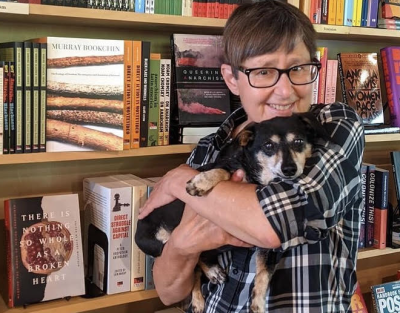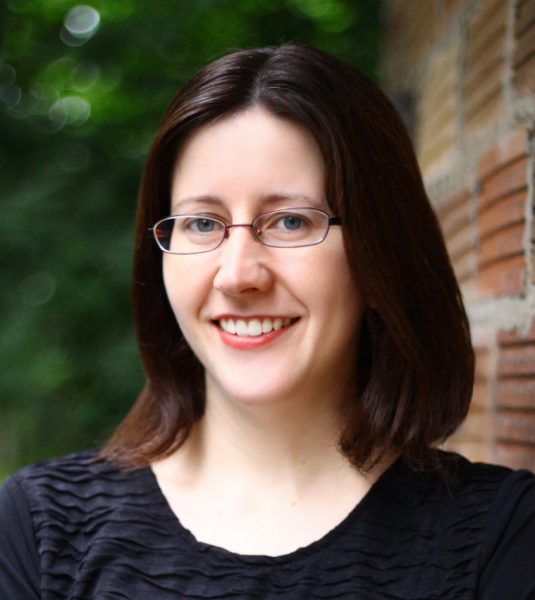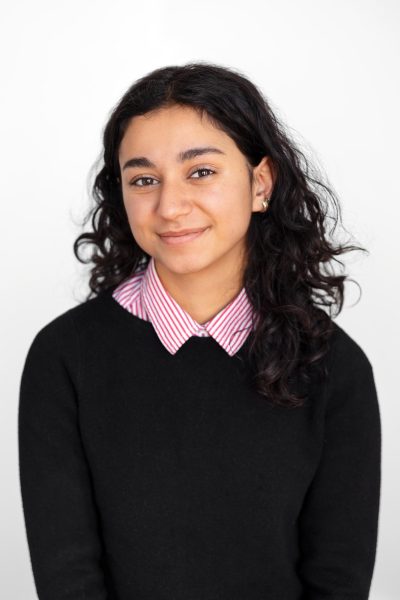Cindy Milstein: Queer Jewish Anarchist, Activist, and Writer

Photo courtesy of Judaism Unbound
Cindy Milstein
Cindy Milstein, a queer Jewish anarchist, activist, and writer, came to Oberlin last Friday to talk about their latest work, an anthology they edited titled There is Nothing So Whole as a Broken Heart: Mending the World as Jewish Anarchists.
This interview has been edited for length and clarity.
Could you give me an overview of how you define Jewish anarchism?
I’ll start with how I understand anarchism, which is a political philosophy of freedom that isn’t that old; maybe 150, 175 years old. It looks at how our forms of social relationships and social organization could revolve, or should revolve, around aspiring to be a social structure of free people in a free society of free beings, not just humans. Anarchism has a dual process or practice. It’s very much about questioning and dismantling all forms of hierarchy, domination, oppression, and subjugation — things like the state, colonialism, capitalism, fascism, et cetera. In its place, and at the same time, anarchism tries to envision and experiment with how we structure our daily lives as much as possible around egalitarian, do-it-ourselves forms of self-organization: self-determination, community self-defense, self-governance. Anarchists fill that out with a whole constellation of ethics, like solidarity, collective care, and mutual aid.
We’re now in the Hebrew year 5783, and Judaism spans the whole world and all races, genders, and cultures. It’s a religion, but it’s a lot more. It’s a philosophy, an ethic, a way of being, a culture, and it’s kind of a way of thinking, too. At the core of Jewishness and Judaism is this foundation of continually questioning and interpreting and communally coming at ways of living. So, putting those together, I understand the core of Jewishness and Judaism as being ultimately a story of liberation and how we continually strive for that in the here and now, wherever we end up. I understand Judaism as a sacred duty, which goes along with anarchism.
For most of that history — and I understand myself as a diasporic Jew — we’ve existed outside of empires or states or nations. We’ve almost never been part of those bodies, yet we’ve continually created these really powerful communities. So to me, Judaism and Jewishness is this incredible experiment and beautiful lived practice of having community and solidarity and life without states. Anarchism by itself is a political philosophy in practice — it’s not enough in itself, it isn’t the whole of life. It’s a politics, in a sense. So, anarchism beautifully says we should always bring the whole of who we are to anarchism, which is how Judaism fits in with it.
There’s this emergence of Jewish anarchism and Indigenous anarchism and Black anarchism. They are ways we understand how, when we bring together the deep parts of ourselves to anarchism, it’s very complimentary, and it creates a much richer fabric and in turn makes anarchism more interesting.
Why is Jewish anarchism resurging right now? What makes it important and relevant today?
I’ll start off by saying there’s always been a disproportionate number of Jews within anarchism, and Jewish anarchists have been completely integral to anarchism as it was established. A lot of the Jewish anarchists have said, “We’re against all forms of higher domination, and that includes religion.”
They understood religion to be this thing that was imposed upon us, which often it is just because there are large-scale institutionalized religious structures no matter what denomination of religion — structures of Christian hegemony or capitalism. So, there was this real rejection of that. I think Jewish anarchism is reemerging because we’re facing a really difficult time period as human beings, with fascism, ecocide, et cetera. There’s this need for a deep sort of spirituality or sense of meaning that I think a lot of people are returning to. A lot of Jewish anarchists now are saying, “I can find that in my Jewishness and bring it to anarchism without it having to be hierarchical.”
Jewish anarchism has a lot to say from experience and wisdom around emergent phenomena right now, like fascism and antisemitism. Unfortunately, we have a lot of experience and playbooks in how you fight and try to survive fascism, and how you defend each other and protect each other.
How could Jewish anarchism be applied now in the U.S.?
For one, it offers this beautiful joy, which I think we need right now. There’s always been singing songs, and there’s a whole bunch of new young Jewish anarchists who are writing beautiful songs and radical Jews who are singing them together in public spaces — songs of liberation and freedom songs about not liking cops and wanting to take care of each other. Another powerful practice which has been reemerging among mostly queer, trans, and feminist Jewish anarchists is practices of healing arts. There’s a long, long tradition in Judaism of using all sorts of medicinal herbs. Another practice that has been really powerful is almost all Jewish holidays and rituals.
A lot of Jewish anarchists have been bringing those storytelling practices as rituals into spaces that aren’t just Jewish. We’ve been creating a lot of our own spaces, which right now is again because the social fabric is so torn. The pandemic and other things have shut down a lot of communal spaces, and in the meantime, Jewish anarchists have been like, “We can find community around religion, though we welcome anyone in — freedom isn’t just for Jews.” In Atlanta right now, there’s a frontline defense against this forest that is slated to be cut down to build a gigantic police training facility. A lot of Jewish anarchists have been bringing all sorts of rituals into this beautiful wooded space.
What does liberation look like in the context of Jewish anarchism?
One of the core stories within Judaism is that we were enslaved and treated really badly, and people resisted in multiple ways and finally freed themselves. At the beginning of the story, the first thing people do is build this temporary space — a tent. It was meant to be this sacred space of community, where people come together to talk about what it means to wander toward freedom. They could take this space with them everywhere. The story ends with never actually getting true freedom or liberation. What I would understand about Jewish anarchism, and any form of anarchism, is that we’re always gonna have to be struggling for what liberation and freedom look like. But to me, the goal is in the here and now, constantly trying to act as if it’s already here.
So how do we actually not rely on police but rely on each other? How do we take care of each other deeply? We are here, we can form communities of solidarity and care and mutual aid and self-organization, self-defense, all the many things I mentioned — we can do that now. That already begins to tell us what freedom should look like. You don’t really even need labels while taking care of each other, living in community. There are ways to figure out how to deal with things when they’re hard without having to rely on prisons and profound forms of structural violence like capitalism or heteropatriarchy. Jewish anarchism is a continual practice of “we are doing it here and now.”
It’s not enough, but every time we feel the beauty of having a life-giving space, it feels like liberation.








